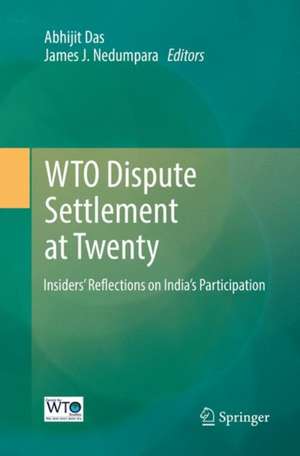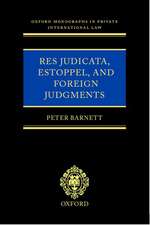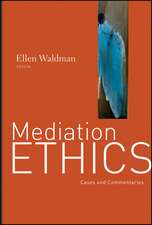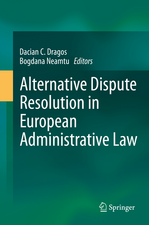WTO Dispute Settlement at Twenty: Insiders’ Reflections on India’s Participation
Editat de Abhijit Das, James J. Nedumparaen Limba Engleză Paperback – 22 apr 2018
| Toate formatele și edițiile | Preț | Express |
|---|---|---|
| Paperback (1) | 557.46 lei 38-44 zile | |
| Springer Nature Singapore – 22 apr 2018 | 557.46 lei 38-44 zile | |
| Hardback (1) | 576.62 lei 38-44 zile | |
| Springer Nature Singapore – 19 apr 2016 | 576.62 lei 38-44 zile |
Preț: 557.46 lei
Preț vechi: 696.82 lei
-20% Nou
Puncte Express: 836
Preț estimativ în valută:
106.68€ • 110.97$ • 88.07£
106.68€ • 110.97$ • 88.07£
Carte tipărită la comandă
Livrare economică 11-17 aprilie
Preluare comenzi: 021 569.72.76
Specificații
ISBN-13: 9789811092060
ISBN-10: 9811092060
Pagini: 255
Ilustrații: XVIII, 255 p. 5 illus., 3 illus. in color.
Dimensiuni: 155 x 235 mm
Ediția:Softcover reprint of the original 1st ed. 2016
Editura: Springer Nature Singapore
Colecția Springer
Locul publicării:Singapore, Singapore
ISBN-10: 9811092060
Pagini: 255
Ilustrații: XVIII, 255 p. 5 illus., 3 illus. in color.
Dimensiuni: 155 x 235 mm
Ediția:Softcover reprint of the original 1st ed. 2016
Editura: Springer Nature Singapore
Colecția Springer
Locul publicării:Singapore, Singapore
Cuprins
Chapter 1. Introduction (by Editors).- Chapter 2. India’s Trade Disputes:
Implications for Public Policy (by Rajeev Kher).- Chapter 3. WTO and its Dispute Settlement Mechanism (by V.S. Seshadri).- Chapter 4. India’s Initial WTO Disputes - An Analysis in Retrospect (by Scott D. Andersen, Deepak Raju).- Chapter 5. One Too Many: Significant Contributions of India to the WTO Dispute Settlement Jurisprudence (by Abhijit Das, Jayant Raghu Ram).- Chapter 6. The US – Shrimp Appeal: 20 Years On (by Arthur E. Appleton).- Chapter 7. Recollections and Reflections of a Stakeholder in WTO Disputes (by Siddhartha Rajagopal).- Chapter 8. An overview of WT/DS141: EC – Anti-Dumping Duties on Imports of Cotton-Type Bed Linen from India (Folkert Graafsma, Siddartha Rajagopal).- Chapter 9. WTO Dispute on EC-Tariff Preferences: Systemic Implications (by Atul Kaushik).- Chapter 10. India – Additional Import Duties: Tax Reforms via WTO (by Jayant Dasgupta).- Chapter 11. Turkey’s Safeguard Measures on Cotton Yarn: Resolution by Consultations (by Mukesh Bhatnagar).- Chapter 12. India- Agricultural Products: Defending India’s First SPS Dispute (James J. Nedumpara, Ashish Chandra, Garima S. Deepak).- Chapter 13. US- Carbon Steel (India): A Major Leap in Trade Remedy Jurisprudence (by Adarsh Ramanujan, Atul Sharma, S. Seetharaman).- Chapter 14. Conclusion (by Editors).
Implications for Public Policy (by Rajeev Kher).- Chapter 3. WTO and its Dispute Settlement Mechanism (by V.S. Seshadri).- Chapter 4. India’s Initial WTO Disputes - An Analysis in Retrospect (by Scott D. Andersen, Deepak Raju).- Chapter 5. One Too Many: Significant Contributions of India to the WTO Dispute Settlement Jurisprudence (by Abhijit Das, Jayant Raghu Ram).- Chapter 6. The US – Shrimp Appeal: 20 Years On (by Arthur E. Appleton).- Chapter 7. Recollections and Reflections of a Stakeholder in WTO Disputes (by Siddhartha Rajagopal).- Chapter 8. An overview of WT/DS141: EC – Anti-Dumping Duties on Imports of Cotton-Type Bed Linen from India (Folkert Graafsma, Siddartha Rajagopal).- Chapter 9. WTO Dispute on EC-Tariff Preferences: Systemic Implications (by Atul Kaushik).- Chapter 10. India – Additional Import Duties: Tax Reforms via WTO (by Jayant Dasgupta).- Chapter 11. Turkey’s Safeguard Measures on Cotton Yarn: Resolution by Consultations (by Mukesh Bhatnagar).- Chapter 12. India- Agricultural Products: Defending India’s First SPS Dispute (James J. Nedumpara, Ashish Chandra, Garima S. Deepak).- Chapter 13. US- Carbon Steel (India): A Major Leap in Trade Remedy Jurisprudence (by Adarsh Ramanujan, Atul Sharma, S. Seetharaman).- Chapter 14. Conclusion (by Editors).
Recenzii
“The book is written in an engaging style. All the contributors have presented their views in a clear and lucid manner. … the book is an important contribution to the study of legal and political aspects of WTO dispute settlement mechanism and must be read by all scholars of WTO law.” (Sheela Rai, Indian Journal of International Law, Vol. 56 (2), 2016)
Notă biografică
Abhijit Das is Professor and Head of Centre for WTO Studies at the Indian Institute of Foreign Trade (IIFT). He is one of the leading policy analysts in the field of international trade in India. He has worked as a Director with the Department of Commerce and UNCTAD before joining the Centre for WTO Studies, IIFT.
James J. Nedumpara is Associate Professor and Executive Director, Centre for International Trade and Economic Laws at Jindal Global Law School. He has more than fifteen years of experience in the field of international trade and has worked with leading law firms, corporate firms and also UNCTAD before joining academia. His specialization is in trade remedy law and international trade regulation.
James J. Nedumpara is Associate Professor and Executive Director, Centre for International Trade and Economic Laws at Jindal Global Law School. He has more than fifteen years of experience in the field of international trade and has worked with leading law firms, corporate firms and also UNCTAD before joining academia. His specialization is in trade remedy law and international trade regulation.
Textul de pe ultima copertă
This book focuses on India’s participation in the WTO dispute settlement system, at a time when India has emerged as one of the most successful and prominent users of WTO dispute settlement among the developing countries. It offers a unique collection of perspectives from insiders – legal practitioners, policymakers, industry representatives and academics – on India’s participation in the system since its creation in 1995. Presenting in-depth analyses of substantive issues, the book shares rare insights into the jurisprudential significance, political economy contexts and capacity-building challenges faced by India. It closely examines India’s approach in effectively participating in the WTO’s dispute settlement mechanism including the framing of litigation strategies, developing legal and stakeholder infrastructure, implementing dispute settlement decisions, and the impacts of the findings of the WTO panels / Appellate Body on domestic policymaking and India’s long-term trade interests. In addition to discussing the key “classic” jurisprudential issues, the book also explores domestic regulatory and policy issues, complemented by selected case studies.
Caracteristici
Presents unique perspectives and commentaries of India’s WTO disputes by the key participants and insiders Offers rare insights into India’s litigation strategies, political economy concerns and capacity-building challenges in WTO dispute settlement Provides a first-hand account of India’s engagement and remarkably successful use of the WTO dispute settlement system Includes supplementary material: sn.pub/extras









